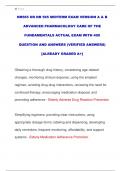1|Page
NR565 OR NR 565 MIDTERM EXAM VERSION A & B
ADVANCED PHARMACOLOGY CARE OF THE
FUNDAMENTALS ACTUAL EXAM WITH 400
QUESTION AND ANSWERS (VERIFIED ANSWERS)
[ALREADY GRADED A+]
Obtaining a thorough drug history, considering age-related
changes, monitoring clinical response, using the simplest
regimen, avoiding drug-drug interactions, reviewing the need for
continued therapy, encouraging medication disposal, and
promoting adherence - Elderly Adverse Drug Reaction Prevention
Simplifying regimens, providing clear instructions, using
appropriate dosage forms, labeling and dispensing, developing
daily reminders, frequent monitoring, affordability, and support
systems - Elderly Medication Adherence Promotion
,2|Page
Need nitrate free interval to prevent tolerance development -
Nitrates Administration Timing
Gender, race, genetics, variability in absorption, placebo effect,
tolerance, pathology, age, and body weight - Medication Outcome
Impact Factors
Required for genetic testing - Genetic Testing Informed Consent
Protects patients from discrimination based on genetic information
by employers and insurance providers - Genetic Information Non-
Discriminatory Act
Practice authority refers to the ability to practice without physician
oversight, while prescriptive authority refers to the ability to
prescribe medications independently - Practice Authority vs.
Prescriptive Authority
,3|Page
Regulated by the jurisdiction of a health professional board -
Prescriptive Authority Regulation
Determined by state practice and licensure laws - Scope of
Practice Determination
Nurse practitioners have the autonomy to evaluate, diagnose,
treat, and prescribe medications independently - Full Practice
Authority
Nurse practitioners are limited and require a formal collaborative
agreement with an outside health discipline - Reduced Practice
Authority
Nurse practitioners are limited and require supervision,
delegation, or team management by an outside health discipline -
Restricted Practice Authority
, 4|Page
Prescriber contact info, patient info, medication details, and
signature - Rx Components
Must contain all elements, avoid error-prone abbreviations, and
use tamper-resistant scripts - Written Prescription Problems
Determining therapeutic dosage, evaluating medication
adequacy, identifying adverse effects, and assessing serious or
life-threatening risks - Reasons for Medication Monitoring
Depends on state, but most can prescribe schedules II-V - APRN
Prescribing Schedules
Leads to longer wait times, unequal relationships, and high need
for providers - Limited Prescriptive Authority Impact




